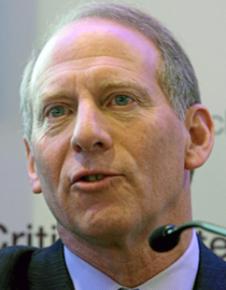Not reckoning with the past
Belfast Telegraph columnist explains why Northern Ireland's upcoming talks, chaired by former U.S. diplomat Richard Haass, are doomed.
THE CHANCES of Richard Haass coaxing the main parties into agreeing on the past are nil. And without agreement on the past, any consensus on the circumstances in which flags might legitimately be flown, or on the routes that parades might reasonably follow, will be flimsy at best and likely to fray.
It was because of the impossibility of parties representing separate communities with sharply incompatible interpretations of history arriving at a single narrative that the 1998 agreement offered no explanation of what the Troubles were about--who started them and why, and which, if any, of the various “combatants,” as they now prefer to style themselves, had right on their side.
The Mitchell talks evaded the key issue that, more than 15 years later, another American has arrived to try to help us resolve.
The implication of the agreement was that the Troubles had just, well, happened--or had happened for reasons buried in history that it served no purpose to excavate. So nobody can fairly be blamed for any of it.

The agreement entitles Shankill bomber Thomas Begley to be remembered as a hero of the fight to free Ireland and the gunned-down assassin of an innocent Catholic, Brian Robinson, to be honored as a defender of the Unionist community. And the British can continue presenting themselves as preternaturally patient peace-mongers, who strove for thankless years to persuade the incorrigible locals to stop their fighting.
Does anybody seriously believe that any of these groups will own up to the things they did--when the leader of the Provisional movement continues to deny that he was ever a member of the Irish Republican Army, much less the founder of the IRA unit which affected the disappearance of informers and people identified as informers by informers?
Will we ever hear a leader of the Ulster Volunteer Force, or of its political wing, volunteering an account the activities of their Mount Vernon battalion, or whatever it is they are calling their gangs these days? Why should they, when the agreement allocates them the same moral and political status as nationalist paramilitaries now lording it over the land?
THE BRITISH are the least likely of the violent parties to tell the truth. The English people are the best in the world that I have ever lived among--I have never lived in Scotland or Wales--but their ruling elite is putrid from centuries of violence and lies.
Anybody who harbors a hope of them coming clean should take a look at the case of Baha Mousa, a 26-year-old hotel receptionist from Basra in southern Iraq who died in military custody in September 2004 after horrendous torture by soldiers of the Queen's Lancashire Regiment: hooded and beaten for 24 hours, the post-mortem examination revealed 93 injuries.
At least five other captured civilians were killed in the same incident.
A succession of British governments has striven to prevent the truth emerging. Lawyers for the victims' families have been denied documents relating to the case, which the Ministry of Defense doesn't deny holding. Every possible legal maneuver--and a couple which may not be legal at all--has been brought to bear to thwart the search for truth.
On what basis could it be believed that the Ministry of Defense would be more forthcoming about the activities of the Force Reaction Unit in the North in the 1980s?
Nor will the past be dealt with by a “truth commission” on South African lines. In South Africa, there was agreement from the outset on what had caused the violence and political dysfunction--white minority rule--and on the solution--Black majority rule. There was no implied equivalence between the defenders and opponents of apartheid.
Here, in contrast, there will be no truth commission. Even in the unlikely event of such a body being established, it will prove a pointless shambles, as its advocates know well: that, indeed, is the point of them putting the idea forward.
We have had to ask an outsider from a country with a regularly deadlocked system of governance and a history of horrendous violence to come among us and knock heads together. Whatever happened to dignity?
But here's an idea. Why not follow the logic of the 1998 agreement and bring in separate electoral rolls for unionists, nationalists and others, with seats at Stormont in proportion to the numbers registering under each designation? Some might be surprised at the numbers who would register as "other."
Let's see how that would work out. It couldn't go worse than what we have now.
First published in the Belfast Telegraph.


